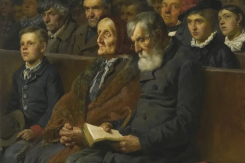Campaigners protest as UK grants first licence to clone
News that the Human Fertilisation and Embryology Authority yesterday issued its first licence for 'therapeutic' cloning, to scientists in Newcastle upon Tyne, has been greeted with concern by campaigners across the UK.
Dr Helen Watt, director of the Linacre Centre for Healthcare Ethics, which is supported by the Catholic Bishops of England and Wales, said she was "appalled but not surprised" by the news that the licence had been granted.
Dr Watt said: "Therapeutic cloning creates a human life in exactly the same way as 'reproductive' cloning does. The only difference is that the embryois intended not for birth but for laboratory destruction.
"It is extraordinary that at a time when adult stem cells are already used to treat a whole range of diseases, the HFEA should consider it 'necessary' to create and destroy human clones.
"Cells from early embryos are difficult to control and have not so far produced a single treatment. Even if treatments were discovered, many patients would have moral qualms about their use.
"Investment should not be diverted from ethical projects with a proven track record to highly speculative projects which make and unmake human lives.
"Human rights are intrinsic to the human being: they do not depend on age, size or level of development. Human life should be welcomed and cherished - not manufactured and exploited.''
Anthony Ozimic from The Society for the Protection of Unborn Children (SPUC) commented: "As the dangers of so-called reproductive cloning loom ever larger, Britain will regret giving approval to the unethical, dangerous and unnecessary practice of so-called therapeutic cloning.
"Human cloning is unethical because it exploits and destroys the lives of countless human beings at their most vulnerable stage of development. Extracting stem cells from embryonic humans kills them. Every human being starts life as an embryo, and retains that genetic identity throughout life. International standards in medical research require that research on a human without his or her consent should only be done if the research is of benefit to that human, yet as Dr Harry Griffin, one of the creators of Dolly the sheep, has admitted: 'Therapeutic cloning is clearly not therapeutic for the embryo.' "Human cloning is dangerous because it will lead to so-called reproductive cloning.
Professor Severino Antinori, one of the scientists who wants to bring a cloned human being to birth, thanked Tony Blair for the government's legalisation of so-called therapeutic cloning, because it has made the birth of a cloned baby one step closer. Like other areas of embryo experimentation, human cloning is likely to produce none of the promised medical benefits, but it will lead to the birth of cloned babies - possibly on a vast scale.
"Human cloning is unnecessary because adult stem cell research, a rapidly advancing ethical alternative to embryo experimentation, is already providing treatments for the very same diseases that pro-cloning scientists claim to be interested in treating. Even in the unlikely event that experiments on embryos did prove to have some beneficial effect, it would still be unacceptable to use human beings in this way."
Professor Jack Scarisbrick, national chairman of LIFE, said: "Let's be quite clear about what is at stake. Cloning involves the manufacture of a new kind of human being - one generated asexually and without traditional parentage - with the express purpose of destroying it once its stem cells are removed. This is manipulation, exploitation and trivialisation of human life of a frightening kind.
"Of course we are told that this therapeutic cloning, as it is called, will open the way to curing Alzheimer's, Parkinson's and other degenerative diseases. But we have heard those promises so often before and anyway, the end does not justify the means. This is a fundamental principle.
"We are all in favour of conquering terrible diseases. But we do not need cloning to do so. Stem cells taken from adults are likely to be just as good, if not better.
"The real reason for seeking this permission is probably as much about power, forbidden fruit and breaching taboos as curing diseases. It's runaway science.
"We should do as the French and Italians have just done namely, forbid all cloning. That is the civilised thing to do. As the French have said, cloning is a crime against the human species."
A spokesperson for Comment on Reproductive Ethics (CORE) said: "What can be said of a society which legalises destructive experiments on its own kind?.
"This is a tragic decision, which will result in further relentless destruction of early human life. In a country which ferociously fights for the rights of animals on an almost daily basis, it is frightening that we have absolutely no compassion for the human embryo.
"The justification for this licence is vague and unscientific. The HFEA will not reveal who sits on their licensing committee, who peer reviews such applications, or the names of their experts in the field of diabetes. It is impossible for the public to know what is going on behind their sealed doors.
"The human embryo is allegedly accorded some protection under UK law, but with the undemocratic HFEA as custodian of the embryo, there is little hope that it will ever be protected adequately. The HFEA is an organisation which never says 'No'. 'Majority world opinion is opposed to human cloning and a decision has yet to be taken at UN level. In some European countries (Italy, etc.) scientists would be imprisoned for doing what the HFEA has authorised today. Human cloning is about the future of mankind, and we need greater authority than an unelected government quango to determine what is right and what is wrong. "
Along with other pro-life groups, CORE is taking legal advice as to the legality of the licence issued today. A Judicial Review is under consideration.





















